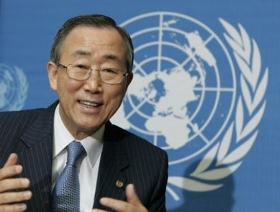BY ROB SALERNO – African leaders met at the annual African Union summit in Addis Ababa, Ethiopia, this weekend and were treated to a speech by United Nations Secretary-General Ban Ki-Moon urging them to respect the rights of their lesbian, gay, bisexual and trans citizens. It’s an important message, given that most (but not all) of the countries that ban homosexuality are on the continent, and it’s good to see that more and more international leaders are drawing attention to queer rights.

This, of course, follows US Secretary of State Hillary Clinton’s landmark queer rights speech to the UN Human Rights Council in December, President Obama’s queer rights foreign policy directive, and UK Prime Minister David Cameron’s vocal pushing for gay rights in the Commonwealth last year.
Of course, our own foreign minister, John Baird, claims to be standing up for gay rights around the world, too, and is getting heaps of praise for it from the mainstream media. Xtra, however, has not been as impressed.
Ban’s speech came with a caveat, however. He also warns leaders to follow the wishes of their people, reminding them all of the Arab Spring that continues to push out dictators in Arab states (some of whom, such as Libya, Tunisia and Egypt, are members of the AU and continue to ban homosexuality). But here’s the problem: what are leaders to do when their populations are largely opposed to gay rights and do want gays executed?
The difficult path between democracy and minority rights is also being illuminated in the US, where New Jersey’s Republican Governor Chris Christie is trying to goad his Democrat-controlled state legislature to abandon its push for a gay marriage law under threat of veto, in favour of putting the issue on the ballot. Democrat leaders are naturally horrified at the suggestion that anyone’s civil rights should be put to a referendum. And history doesn’t read too kindly on those who do. As Senate President Steve Sweeney points out, “The last time this state had a referendum on a civil right, the woman’s right
to vote, in 1915, it failed.”
One scholar is calling for gay marriage supporters to boycott any possible referendum in order to deny it of legitimacy, citing failed civil rights referendums of the past.
But that’s not the path being taken in Maine, where equal marriage supporters have delivered more than 100,000 signatures in order to put the issue on the November ballot. Maine famously became the first US state to legislate gay marriage with a governor’s signature, only to have it overturned in a narrowly won referendum to ban gay marriage in 2009.
Putting everything in perspective, two gay rights activists in Jamaica have an editorial in the Jamaica Gleaner celebrating the advances that the gay community there made over 2011. It was a good year in that it ended with Jamaicans electing a president who made a point of endorsing the rights of queer Jamaicans. But then again, among the things to be celebrated is the fact that “the first National Survey on Attitudes and Perceptions of Jamaicans towards
same-sex relationship highlighted that 20 percent of Jamaicans are tolerant.” There’s still a long way to go.

 Why you can trust Xtra
Why you can trust Xtra


